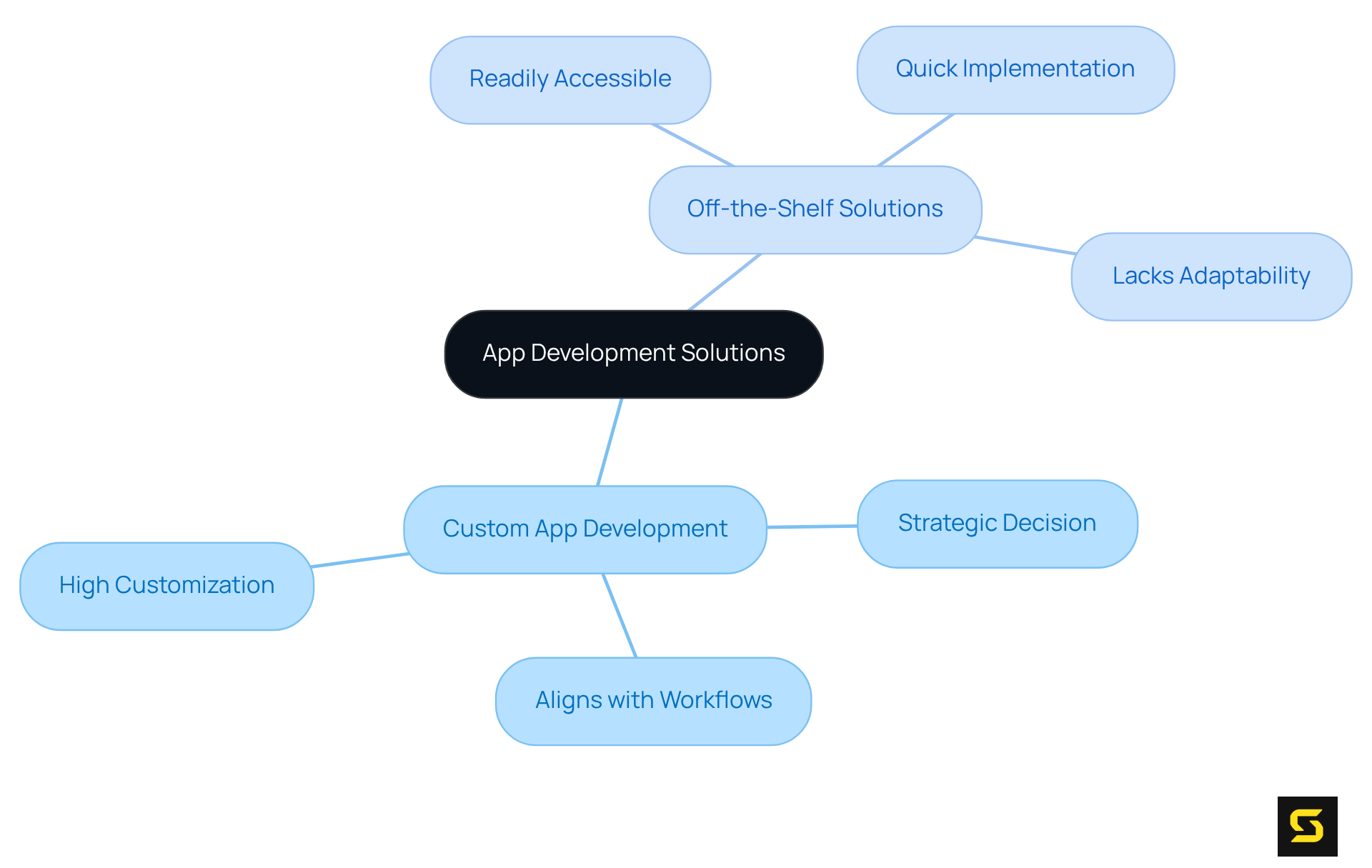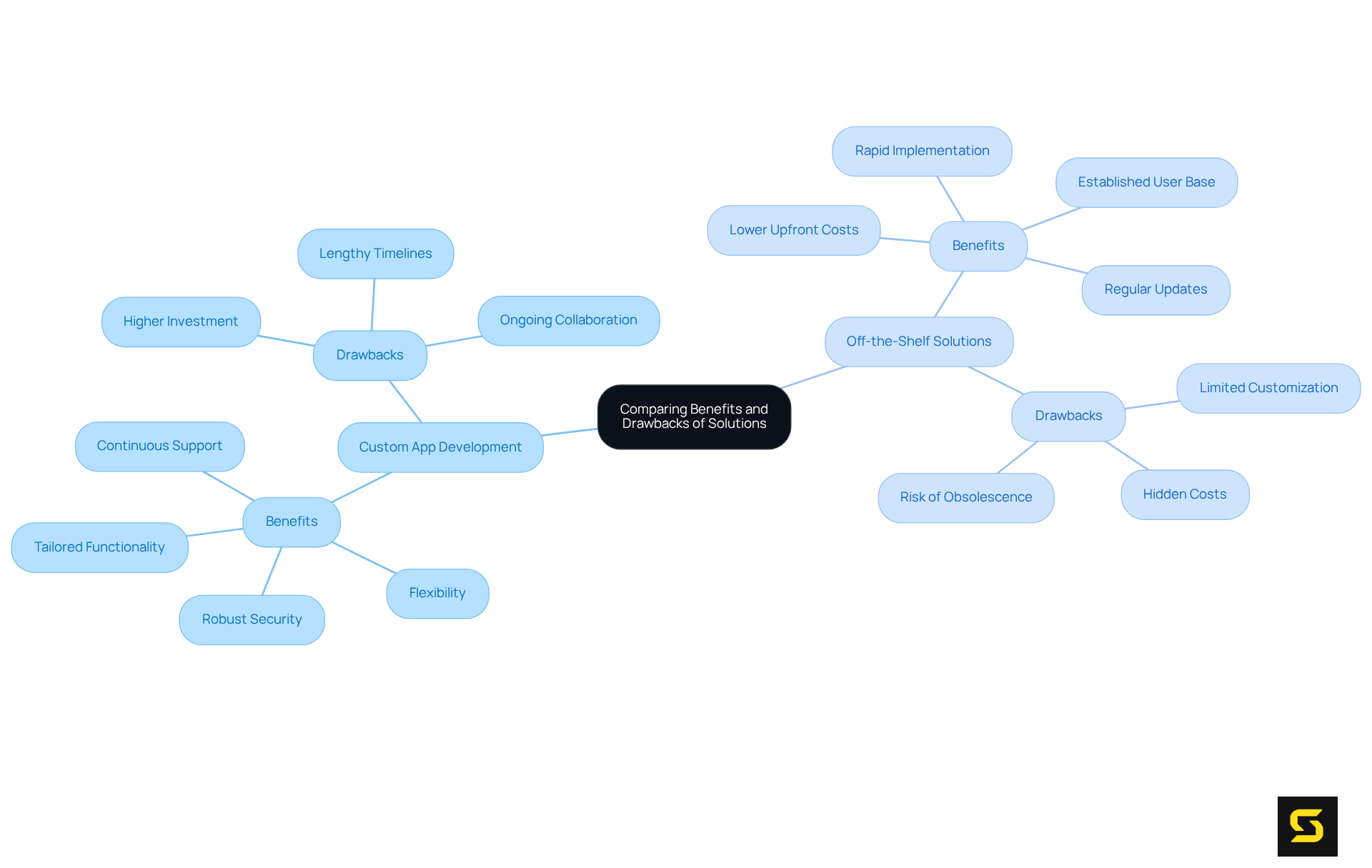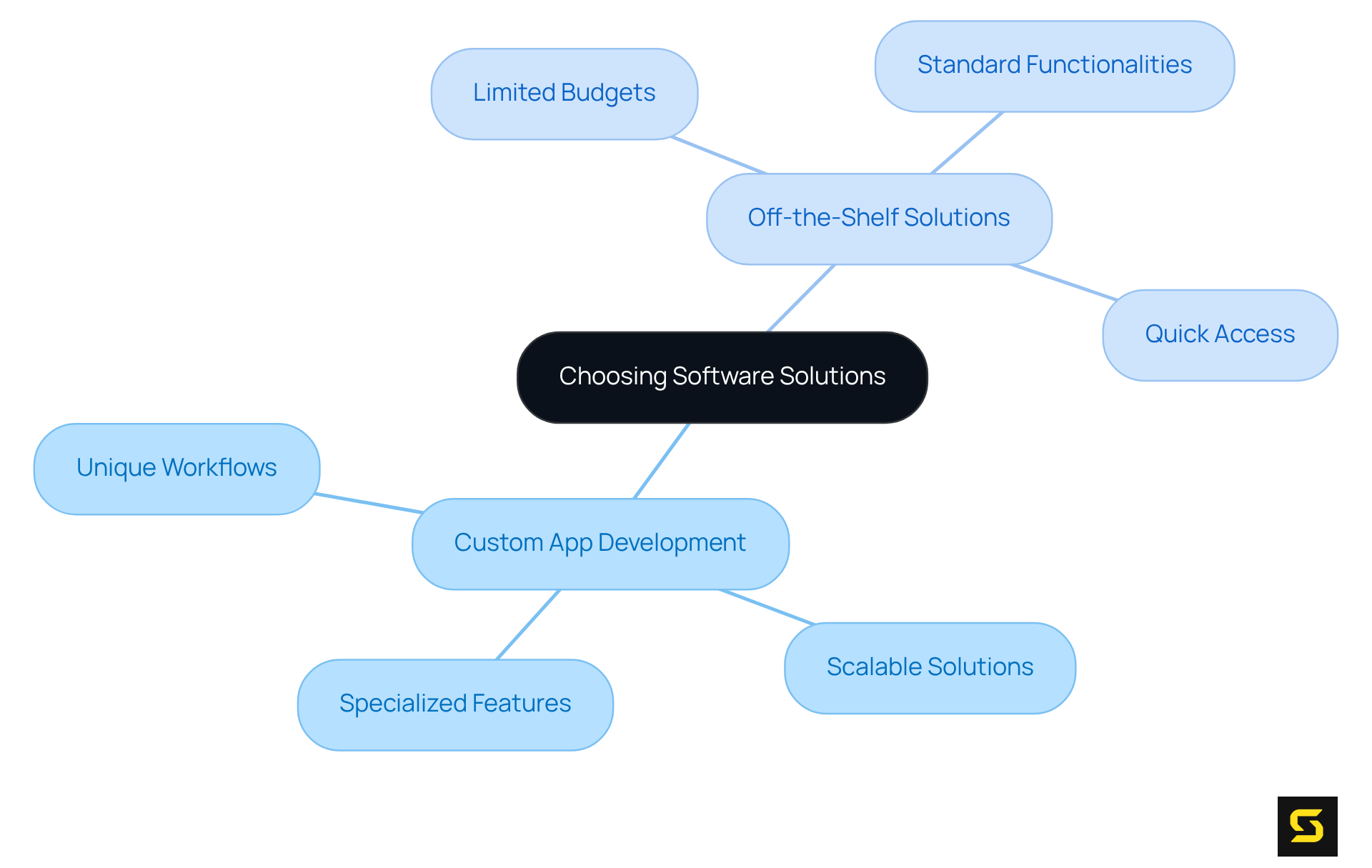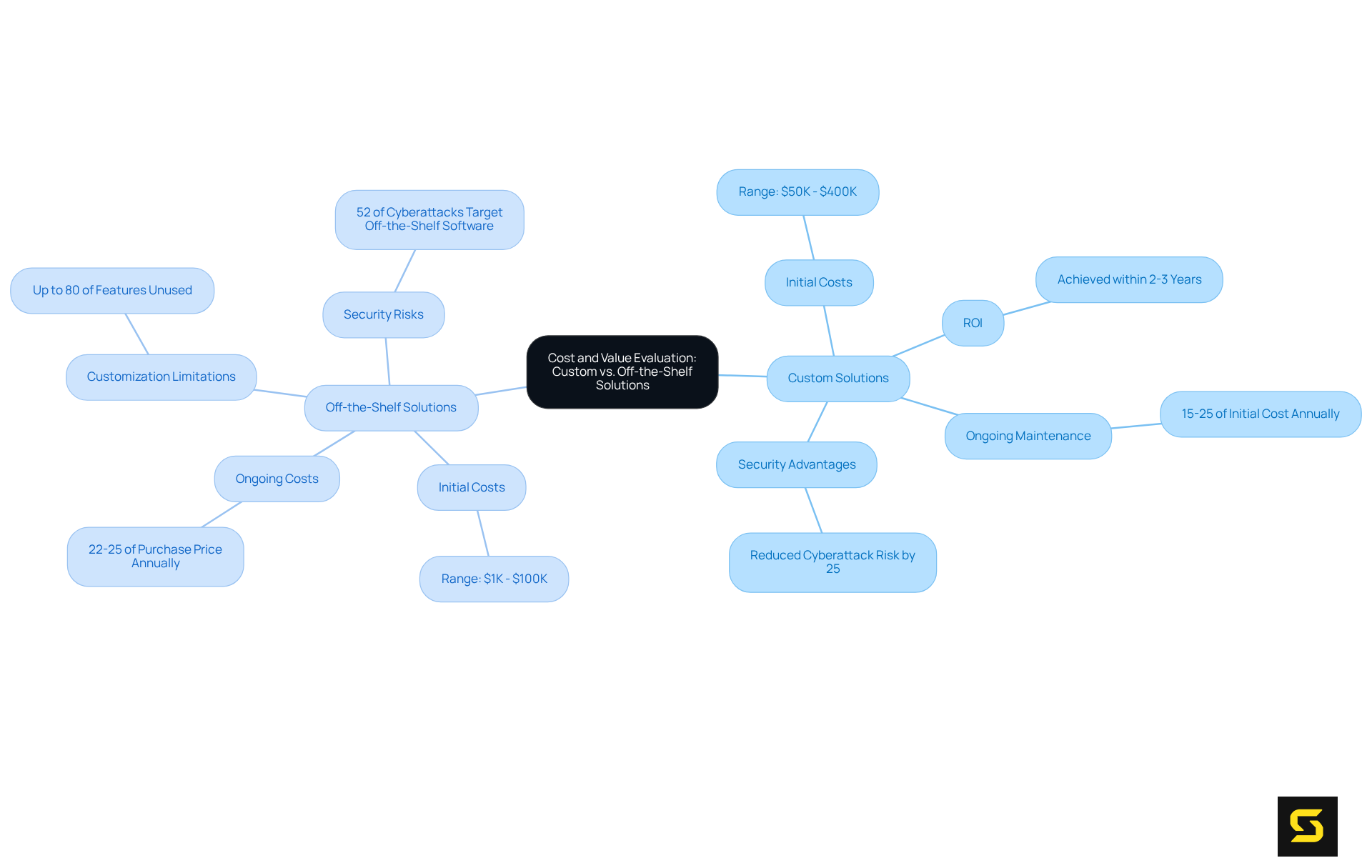Overview
This article presents a compelling comparison between custom app development companies and off-the-shelf solutions.
Custom development stands out for its tailored functionality and scalability, essential for businesses aiming for long-term growth.
In contrast, off-the-shelf products offer quicker implementation at a lower initial cost, appealing to those seeking immediate solutions.
However, it is crucial for businesses to consider their specific needs and the potential inefficiencies associated with off-the-shelf software.
When making strategic decisions, it becomes clear that custom solutions often yield greater operational effectiveness, despite requiring higher upfront investments.
Therefore, businesses are encouraged to weigh these factors carefully to ensure optimal alignment with their growth objectives.
Introduction
In the dynamic landscape of technology, businesses encounter a pivotal decision: custom app development versus off-the-shelf solutions. Custom applications provide tailored functionality that aligns seamlessly with specific operational needs, while off-the-shelf products offer rapid deployment and lower initial costs.
Yet, the critical question arises: which option genuinely delivers long-term value and adaptability in an ever-evolving market? This article explores essential insights that can guide organizations in making an informed decision, examining the unique benefits and potential pitfalls of each approach.
Understanding Custom App Development and Off-the-Shelf Solutions
A custom app development company specializes in the process of creating applications specifically tailored to meet the unique requirements of a business or organization. This approach allows for a high level of customization, ensuring that the application aligns seamlessly with the company's workflows, user needs, and strategic goals. In contrast, ready-made products are pre-built applications designed for a broad audience. While these options are readily accessible and can be implemented swiftly, they often lack the adaptability necessary to accommodate specific business processes. Although off-the-shelf software may provide immediate functionality, it frequently falls short of addressing the unique challenges faced by individual organizations, potentially leading to inefficiencies in operations. Therefore, investing in a custom app development company is not just a choice; it is a strategic decision that can significantly enhance operational effectiveness.

Comparing Benefits and Drawbacks of Custom vs. Off-the-Shelf Solutions
When evaluating a custom app development company against off-the-shelf solutions, distinct benefits and drawbacks emerge, underscoring the importance of informed decision-making.
Custom App Development:
- Benefits:
- Tailored functionality that precisely addresses unique business requirements.
- Enhanced flexibility and scalability, allowing for seamless adaptation as the organization grows.
- Robust security features developed by a custom app development company to meet specific compliance and operational needs.
- Continuous support and maintenance from dedicated development teams, ensuring long-term viability and performance.
- Drawbacks:
- Higher initial investment, typically ranging from $100,000 to over $1.5 million, depending on complexity.
- Lengthier development timelines, often requiring several months of planning and execution.
- Necessitates ongoing collaboration among stakeholders to align objectives and expectations.
Off-the-Shelf Solutions:
- Benefits:
- Lower upfront costs, making them accessible for startups and smaller businesses.
- Rapid implementation abilities, enabling organizations to deploy applications swiftly without lengthy development phases.
- Established user base and proven functionality, reducing the risk associated with new application adoption.
- Regular updates and vendor support, ensuring the software remains functional and secure.
- Drawbacks:
- Limited customization options, often resulting in inefficiencies as businesses may only utilize 10-15% of available features.
- Potential hidden costs related to licensing agreements and mandatory upgrades, which can escalate over time.
- Risk of obsolescence as business needs evolve, leading to reliance on outdated functionalities that may not align with current operational demands.
In 2025, the average expense of a mobile app breach is projected to reach $4.76 million, highlighting the critical importance of robust security measures that tailored approaches can offer. Industry leaders emphasize that while ready-made applications provide prompt implementation, they frequently lack the flexibility necessary for sustained growth, positioning a custom app development company as a more strategic option for organizations with distinct operational requirements.

Identifying Use Cases: When to Choose Custom Development or Off-the-Shelf Solutions
Deciding between a custom app development company and ready-made options is often contingent upon the specific context and needs of the business.
Use Cases for Custom App Development Company:
- Organizations with unique workflows that cannot be accommodated by standard software often find the services of a custom app development company essential.
- Additionally, businesses anticipating significant growth or operational changes require scalable solutions, which a custom app development company can tailor to their evolving needs.
- Furthermore, companies that need specialized features for compliance or security may discover that off-the-shelf products fail to meet their stringent requirements, leading them to seek a custom app development company.
Use Cases for Off-the-Shelf Solutions:
- Startups or small businesses with limited budgets typically seek quick deployment options, making off-the-shelf solutions appealing.
- Organizations that require standard functionalities, widely applicable across industries, also benefit from these readily available products.
- Lastly, companies prioritizing prompt access to applications without extensive customization often favor off-the-shelf solutions, allowing them to focus on immediate operational needs.

Evaluating Cost and Long-Term Value of Custom vs. Off-the-Shelf Solutions
When evaluating the cost and long-term value of tailored solutions from a custom app development company versus off-the-shelf solutions, several critical factors must be considered.
Custom Development Costs:
The initial investment for custom software can vary widely, typically ranging from $50,000 to $400,000, depending on the complexity and specific requirements of the project. Continuous costs for maintenance, updates, and support typically represent 15-25% of the initial development expense each year, in contrast to 22-25% of the purchase price for ready-made applications. Even with greater initial expenses, the long-term benefits of tailored approaches provided by a custom app development company frequently exceed these early expenditures, as they can significantly enhance operational efficiency and productivity. Businesses that work with a custom app development company often report achieving a return on investment (ROI) within 2-3 years, driven by reduced operational costs and improved automation.
Off-the-Shelf Costs:
Off-the-shelf solutions typically present lower upfront costs, ranging from $1,000 to $100,000 for basic functionalities. However, companies must consider the cumulative impact of subscription fees and licensing costs, which can escalate over time, potentially leading to higher long-term expenses. While these options offer instant functionality, their limited customization capabilities frequently lead to inefficiencies that can compromise initial savings. Studies indicate that up to 80% of features in commercially available applications remain unused, highlighting the mismatch between generic offerings and specific business needs. Furthermore, 52% of cyberattacks specifically target weaknesses in commonly used off-the-shelf software, underscoring the security advantages that tailored options can provide.
Real-world instances further demonstrate the long-term worth of tailored approaches provided by a custom app development company. For instance, Uber's custom-built platform was designed to scale rapidly with its global expansion, accommodating increasing demand and complexity. Similarly, Ledbury successfully integrated its retail and e-commerce systems with the help of a custom app development company, enhancing operational efficiency and customer experience.
In summary, businesses must carefully evaluate the initial costs against the potential long-term benefits and efficiencies gained from each solution. The decision should align with the company's strategic objectives and growth trajectory, ensuring that the chosen software supports sustainable success.

Conclusion
The decision between a custom app development company and off-the-shelf solutions is a critical one for organizations aiming to enhance their operational effectiveness. Custom development provides tailored applications that align closely with unique business needs, whereas off-the-shelf products offer quick and cost-effective solutions, albeit with inherent limitations. Grasping these distinctions is essential for businesses striving to make informed decisions that support their long-term objectives.
Key insights indicate that custom app development, despite its higher initial costs and longer development timelines, delivers substantial long-term value through enhanced functionality, security, and scalability. In contrast, while off-the-shelf solutions may appear attractive due to lower upfront costs and rapid deployment, they frequently result in inefficiencies and hidden expenses that can accumulate over time. The significance of aligning software solutions with specific organizational needs cannot be overstated, as it is directly linked to improved operational efficiency and return on investment.
Ultimately, businesses must meticulously evaluate the advantages and drawbacks of each option in light of their unique circumstances and growth aspirations. Investing in a custom app development company could be a strategic choice that ensures adaptability and resilience in an ever-evolving market. As organizations navigate their software selections, prioritizing long-term value and alignment with operational goals will be paramount for achieving sustainable success in the years ahead.
Frequently Asked Questions
What is custom app development?
Custom app development involves creating applications specifically tailored to meet the unique requirements of a business or organization, allowing for high levels of customization that align with the company's workflows and strategic goals.
How does custom app development differ from off-the-shelf solutions?
Custom app development is designed specifically for a business's needs, while off-the-shelf solutions are pre-built applications intended for a broad audience and may lack the adaptability to meet specific business processes.
What are the advantages of custom app development?
The advantages include a seamless fit with the company's workflows, the ability to address unique challenges, and the potential to enhance operational effectiveness compared to off-the-shelf solutions.
What are the limitations of off-the-shelf software?
Off-the-shelf software may provide immediate functionality but often fails to address the unique challenges of individual organizations, which can lead to inefficiencies in operations.
Why should a business consider investing in custom app development?
Investing in custom app development is a strategic decision that can significantly enhance operational effectiveness by providing tailored solutions that meet specific business needs.





